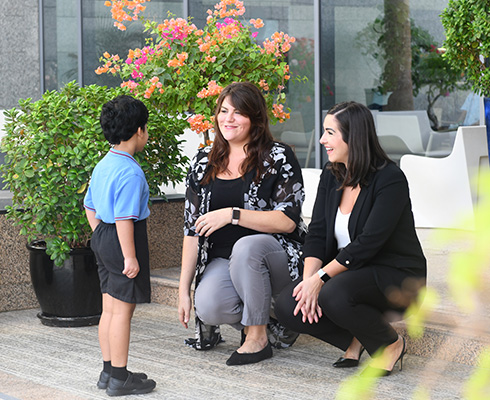Is your partner joining you on your next international teaching job? Will your benefits package be affected? How different is the hiring process? Our Advisers get many questions like this. It is hard to have a one size fits all response as it is highly reliant on both the country and the individual school, so we’ve asked Teacher Horizons Advisers to share their experiences. Many of our Advisers have been international teachers with dependent spouses or vice-versa themselves so they’re the experts!
Teaching abroad with a dependent spouse or non-teaching partner.
Relocating overseas to teach in an international school is never an easy process. On top of that, having to consider the process for your partner, too can add to the challenge. A dependent spouse or dependent partner, previously referred to as a “trailing spouse” refers to having someone accompanying you on your international teaching assignment. We’ve gathered 3 common myths and had them debunked by our expert Advisers.
1. Support for my dependent partner depends on the location of the international school.

Many believe that country dictates what benefits your partner will get but in reality, it is based mainly on the choice of the individual school. The myth around country springs from visa expectations, as some countries will not offer support in you are unmarried. In some cases, support is more likely to be offered if you are married. Our operations director Emily has experience of facing this obstacle “Being unmarried meant that we had to book and pay for our flights, sort visas and find our own jobs. For a country like Cambodia, this wasn’t too challenging. Having said this, getting long term visas in Cambodia is already much more difficult than it was when we all arrived so I can’t imagine it’s as easy as it once was.” Most countries require people to marry to get spousal benefits (and in the UAE, to live together). Candidates are often happy to do this to get the benefits, though!
International teaching in the Middle East with a dependent partner.
The Middle East can be a challenging area to teach overseas with a dependent partner. To live together, never mind, being sponsored, you need to be married. However, there are few exceptions:
- If a married dependent spouse finds a role as a teacher, or in another industry, they risk losing all benefits, as they were hired in-country and are considered a local hire.
- In the Middle East, sometimes, a woman bringing her non-teaching husband can encounter difficulties – in Oman for instance, women cannot sponsor their husbands for a visa. He would need to ensure he could find his own work opportunity to get the visa or face having to do ‘visa runs’ to cross in and out of the country every 30 days.
- In Saudi Arabia (KSA) teachers with a non-teaching spouse have a different process. Teachers must arrive to KSA first and then apply for a family residence visa when arrive. Take note the process can take 6-8 weeks. Once the visa is granted the family can follow.
2. The international school won’t cover flights and visa costs for my partner.

This is not true across the board and is really up to the individual school. Some schools tend to want to support dependents and spouses as it can mean a longer stay in the school. However, there are exceptions. The most challenging situation is if the couple is not married, mentioned above, and if the partner is not a teacher. Most international schools will not be able to assist with the trailing spouse’s visa to live in the country. If you are married you have a much higher chance of support with a visa. As our adviser Tiffany told us: “some schools do not offer to pay for flights and visas for dependents. others do. I think from my experience, it’s about 50/50 schools who do and schools who don’t.”
Some schools support teachers in other ways. Some offer family accommodation while some only offer single accommodation and staff have to take accommodation, so they request singles only. The British School of Kuwait requested that this year because family accommodation was full.
3. There won’t be any opportunities for my partner in the international school.
False. Your partner might be able to find a position as a teaching assistant or support within the school, even in a non-teaching role. This is a common way to bring your partner along with you as some schools find that if both partners are in the same school it might increase longevity. As our Adviser, Tiffany shares: “Some schools work hard to find places for partners even if they are not teachers or have no formal qualifications because they know that it means staff will feel more secure and thus will be more likely to accept roles and stay there”.
The flip side of this is that some schools prefer not to find work for the partner because they know that if they lose one, they will lose two members of staff. Another adviser of ours, Caroline, shared their experience working with a school that will not consider spouses unless they can work in the school. For this reason, they only consider singles or teaching couples. As you can tell, these arevery individual situations that require discussions with your Adviser and the school.
Choose a larger educational institution or international school group to teach in.

Choosing a larger education network might be a way around the difficulty.
Some larger networks e.g. Qatar Foundation and GEMS do offer more comprehensive packages including visa, medical, and flights for a non-teaching spouse. Potentially, this is to keep the net as wide as possible and keep all options open in terms of which teachers they interview. Paramount to this, the larger school groups undoubtedly have larger budgets. A candidate at one of the UWC groups got a role at UWC Moshi and the school covered her non-teaching husband’s flights and great medical insurance.
Teacher Horizons Adviser, Laura shares her experience with us: “I came to the UAE technically as a ‘trailing spouse’ as I wasn’t working for the first year here when my eldest was a baby and GEMS didn’t have any issue with it. Some of the other independent and smaller schools we work with might have a preference for single hires to keep their costs down. Others might be OK with non-teaching spouses but might ask for a contribution to the benefits for the spouse.”
You can reach out to our advisers and find what will work best for your unique situation by Joining Teacherhorizons today!



